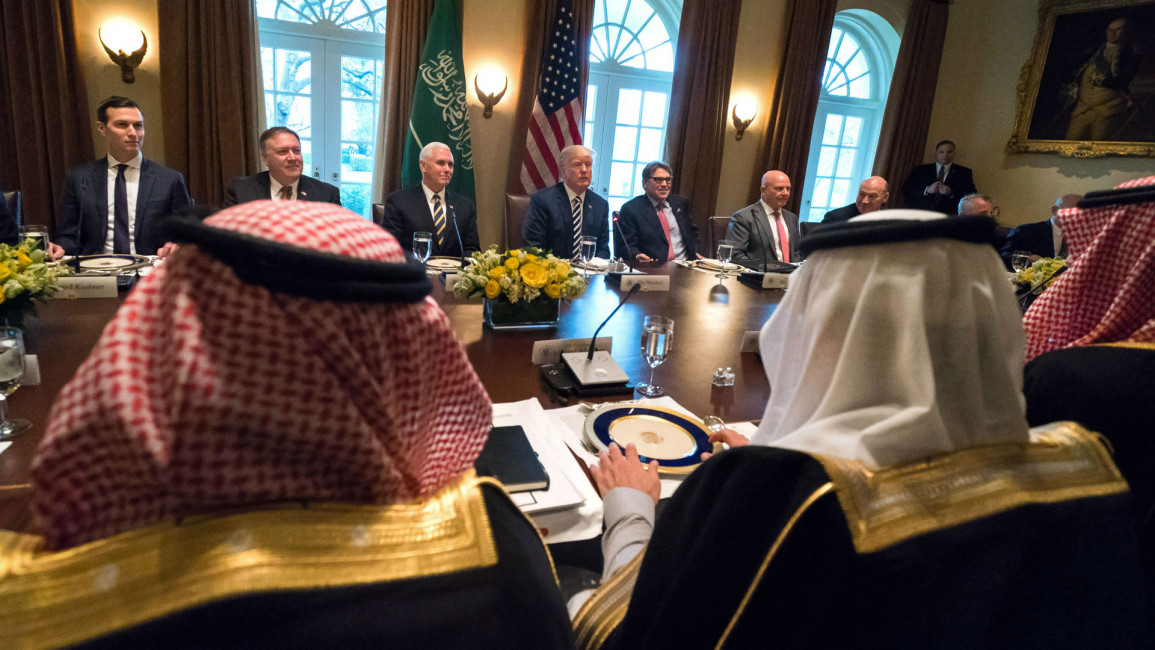Saudi Arabia 'hails' US terror blacklisting of Iran Revolutionary Guards
"The US decision (follows) the kingdom's repeated demands to the international community to address the issue of Iranian-backed terrorism," the official Saudi Press Agency quoted a foreign ministry source as saying.
The source welcomed the US move as a "practical and serious step" in curbing what the kingdom describes as Iranian meddling in the region.
Washington's decision on Monday marked the first time the US branded an arm of a foreign government a terrorist group.
It effectively means that anyone who deals with the Islamic Revolutionary Guard Corps could face prison in the United States.
Sanctions
President Donald Trump called the corps - which has some 125,000 troops and vast interests across the Iranian economy - Tehran's "primary means of directing and implementing its global terrorist campaign".
Tehran swiftly retaliated by blacklisting US Central Command as a terrorist organisation, affecting American troops serving in the wider Middle East from the Horn of Africa to Afghanistan.
On Tuesday, Iranian President Hassan Rouhani accused the US of being the real 'leader of world terrorism' after Washington's move.
Speaking at a ceremony to mark Iran's national nuclear technology day in Tehran, Rouhani defended the Revolutionary Guards as a force that has fought terrorism ever since its creation in 1979.
"Who are you to label revolutionary institutions as terrorists?" Rouhani asked in a speech broadcast live by state television.
The Islamic Republic's president accused US forces of having always been directly or indirectly involved with terrorist groups or acts of terrorism.
"You want to use terrorist groups as tools against the nations of the region... you are the leader of world terrorism.
"Who is propagating and encouraging terrorism in today's world? Who wanted to use ISIS (the Islamic State group) as a tool?" Rouhani asked, suggesting the US is harbouring the leaders of the jihadi organisation.
|
|
"Even now America is hiding the heads of ISIS, even now they are not prepared to tell the regional governments where the heads of ISIS are hiding."
The US decision came as part of already far-reaching attempts to undermine the Iranian government.
The elite force was formed after the 1979 Islamic Revolution with a mission to defend the clerical regime, in contrast to more traditional military units that protect the country's borders.
At home, it has amassed strong political and economic influence.
Abroad, the Guards' prized Quds Force, named for the Arabic word for Jerusalem, supports Iranian allies, including Syrian President Bashar al-Assad and Lebanon's Hizballah - in most cases standing against arch enemy Saudi Arabia.
Rivalry
Sunni powerhouse Saudi Arabia and Shia-dominated Iran have a longstanding rivalry based as much in geostrategic interests as religious differences.
Facing off across the Gulf, the two major oil producers have taken opposing sides for decades in conflicts across the Middle East.
Riyadh broke off diplomatic relations with Tehran in 2016 in protest at the torching of its diplomatic missions by Iranian protesters angry over its execution of a leading Shia cleric.
The Trump administration has maintained a close relationship with the Saudi leadership, despite mounting opposition over the high civilian toll from the kingdom's military intervention in neighbouring Yemen and the murder of US-based Saudi dissident Jamal Khashoggi inside the kingdom's Istanbul consulate.



